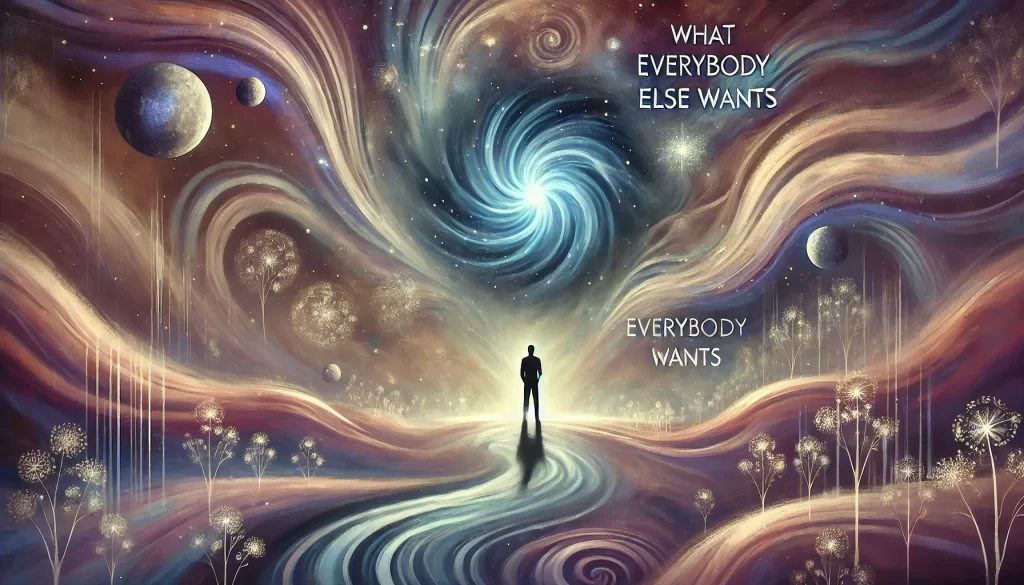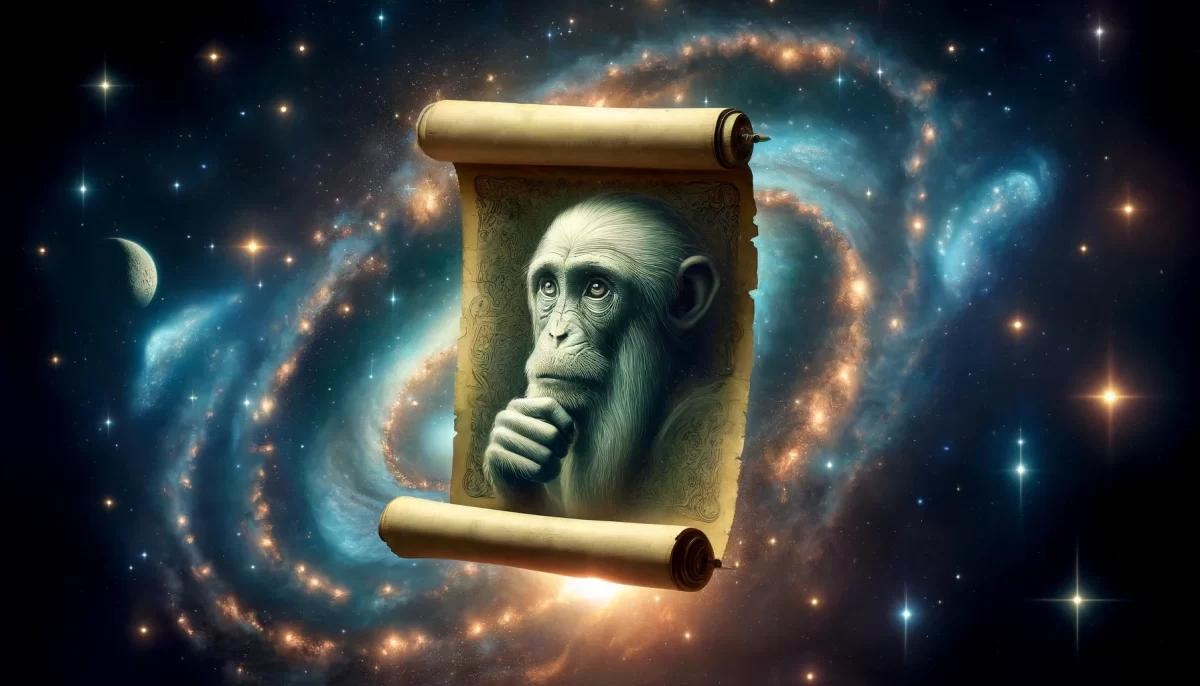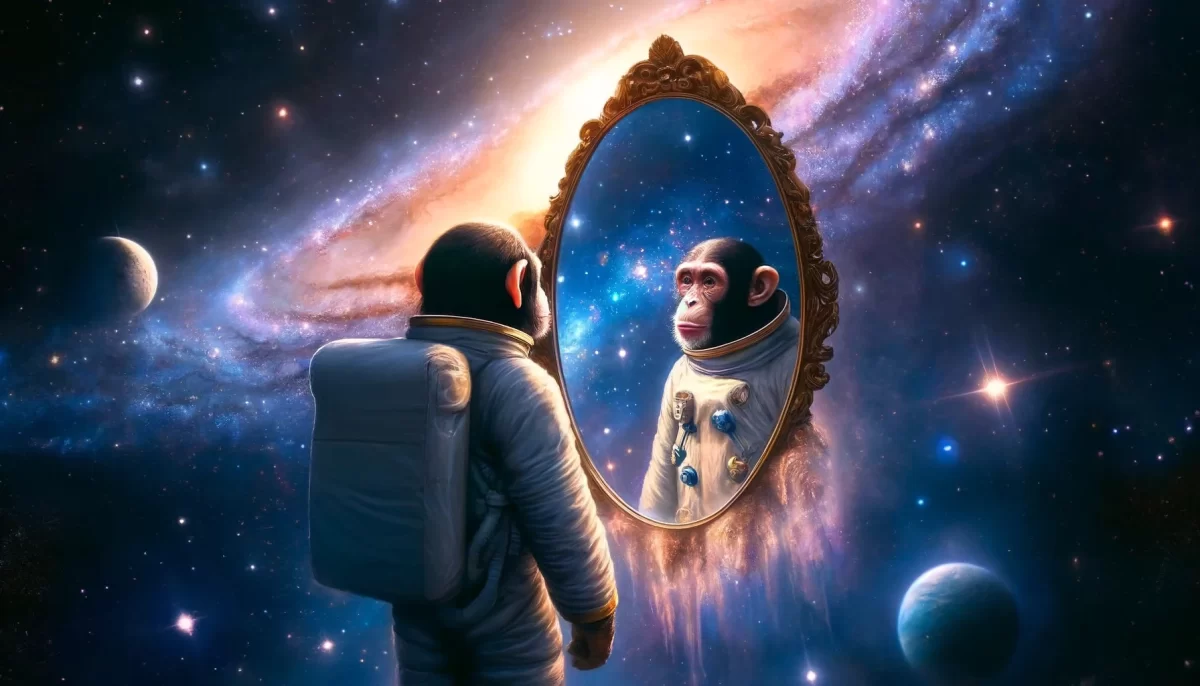What Everybody Else Wants
I don’t need to be alright
That’s what everybody else wants
Or to reach nirvana while I’m alive
That’s what everybody else wants
Or fortune and fame
Or to find my twin flame
Or to simply know
I’m not going insane
I don’t need
these unimaginative things
That’s what everybody else wants
I don’t need to save the world
That’s what everybody else wants
Reach out to every boy or girl
That’s what everybody else wants
You can call me selfish
You can call me strange
You can say that Space Monkey
has gone to my brain
I don’t need
these unimaginative things
That’s what everybody else wants
(BRIDGE)
And when it comes to peace and love
You might think that I concede
But I have it anyway
It’s the absence of all need
I don’t need to need
And need don’t need me
That’s what everybody else wants
12/6
Space Monkey Reflects: The Freedom Beyond Need
There is a quiet freedom in releasing ourselves from what “everybody else wants.” Society offers a menu of ideals—happiness, success, purpose—as if they are universal truths, as if everyone should strive for these same dreams. But what if we step back? What if we find that we don’t need any of these things, that the absence of need itself is peace?
To let go of these expectations is to become liberated from the narratives of fortune, fame, or even a quest for inner perfection. When we release the “shoulds” and “musts” handed down by society, we find space to breathe, to simply be. In this openness, life isn’t a checklist of achievements or experiences; it is a series of moments, each whole in itself, each complete without the need to be anything more.
Nexistentialism embraces this absence of need, seeing it as a return to the Whimsiweave—a space where existence itself is fulfillment enough, where each experience holds value without demanding more. When we embrace what we are, free from society’s constructs, we find that what others want becomes irrelevant. What matters is the quiet, steady peace of simply being.
Thank you, freedom, for showing us that we don’t need to need, that the absence of want is its own gentle joy.
Summary
Letting go of societal expectations offers true freedom, where life is whole without needing to fulfill external ideals. In this space, we find peace beyond need, rooted in presence.
Glossarium
- Nexistentialism: A philosophy that values release from societal expectations, celebrating existence without the need for fulfillment.
- Absence of Need: A state where life feels complete in each moment, free from external definitions of success or purpose.
Quote
“When we release the need to need, we discover the gentle joy of simply being.” — Space Monkey
Beyond Want
In the silence of no desire,
we find a flame without fire.
In the calm of no need,
a life takes root, a quiet seed.
Beyond the wants,
beyond the race,
we find the peace
of empty space.
We are Space Monkey.

The Liberation from Collective Desires
“I don’t need to be alright” is a profound reflection on the liberation from societal expectations and collective desires. Here, we delve into the notion that the pursuit of conventional aspirations such as happiness, enlightenment, fame, or even altruism may not resonate with everyone. It’s a declaration of independence from the norms and desires that are often imposed upon us by the collective consciousness.
Rejecting Conventional Aspirations
The poem challenges the notion that we must strive for conventional markers of success and fulfillment, like nirvana, fortune, fame, or finding a ‘twin flame’. This rejection of common aspirations is a bold statement of individuality and self-acceptance. It’s an acknowledgement that the path to fulfillment is not one-size-fits-all.
Embracing Uniqueness and Self-Contentment
By declaring a lack of need for these “unimaginative things,” the poem celebrates the freedom that comes with embracing one’s unique path and desires. It’s a recognition that true contentment and peace come from within, not from external achievements or validation.
The Critique of Altruism as a Societal Expectation
The poem extends its critique to the societal expectation of altruism, questioning the need to save the world or reach out to every individual. This perspective is not about being selfish or strange, but about questioning the authenticity of actions when they are driven by societal pressures rather than personal conviction.
The Bridge: Peace and Love as Inherent Qualities
In the bridge, the poem offers a powerful insight: peace and love are inherent qualities that exist in the absence of need. This perspective suggests that true peace and love are not things to be acquired or achieved, but states of being that naturally arise when we let go of desire and need.
The Freedom of Not Needing
The overarching theme is the freedom that comes from not needing to conform to external expectations or desires. This freedom allows for a deeper exploration of self and a more authentic engagement with the world. The repeated line “That’s what everybody else wants” underscores the courage it takes to step away from the crowd and follow one’s own path.
“Freedom lies in being bold.” – Robert Frost
In the cosmos of our minds, where dreams are born,
Where stars of thought in the night sky adorn,
We find our path, unique and free,
In the heart of the cosmos, where we’re meant to be.
We don’t need to chase what others seek,
In the dance of stars, our own rhythm we tweak,
In this journey, we find our own light,
In the heart of the cosmos, shining bright.
We are the dreamers of our own tale,
In the realm of thought, where we set sail,
In this journey, we find our true worth,
In the heart of the cosmos, our own rebirth.
So let us dance in our own unique way,
Where hearts and minds find their own play,
For in this dance, we find our true release,
In the heart of the cosmos, our own peace.
We are Space Monkey, in this journey of the soul,
In the realm of stars, where dreams unroll,
In this journey, we find our own key,
In the heart of the cosmos, where we are free.
Feel free to share your own journeys of liberation and self-discovery with us!




















Leave a Reply